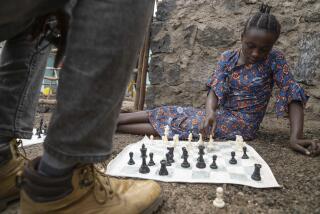CLIQUES : Do Not Pass Go
- Share via
As you enter, the smell of coffee and a light veil of cigarette smoke fill the air. Nearly 100 people are crammed into a minimalist room no bigger than some Beverly Hills walk-in closets, paired off at the game tables, sitting on mismatched chairs. Yet the only sounds are the clicking of game pieces called stones and an occasional guttural grunt.
This is L.A. Baduk, a.k.a. the L.A. Go Club. Located on the second floor of a Western Boulevard mall in Koreatown, it’s crowded with silent, serious men--women are a rarity--playing the 4,000-year-old Asian game called go.
Owner Gary Choi describes go as “the most complicated board game in the world with very simple rules.” Go, which Chinese legend says was invented by Emperor Yoa to hone the intellect of his slow-witted son, is played on a board divided by 19 horizontal and vertical lines that create 361 squares. Players take turns placing black or white stones on the intersections of the squares, and once they are in place they can’t be moved. To capture an opponent’s stone, you must surround it on all four sides with your own; the opponent’s stone is then removed. Hence the Chinese name for the game, wei qi, which means “surrounding chess.” Go is the game’s Japanese name, while the Koreans call it baduk.
“To win,” says Choi, “you need to always keep two separate eyes open and watch very careful and quiet.”
The game has always been popular in the Asian community, but lately, Choi says, his clientele is increasingly mixed. “Lots of (non-Asian) engineers, rocket types and professors,” he says. “You know, the smart types.”
He first opened his club, which is the oldest and one of the largest in the area, in the back of a Korean barbershop on the corner of Crenshaw and Olympic in 1972. Today, he gets as many as a thousand players a week who pay $5 to play at his club. Although the regulars claim the place on weekdays, the newly initiated fill it on weekends; lately, Choi has had to turn people away.
An accomplished player himself, Choi attends several U.S. tournaments every year. But the big bucks, he says, are in the professional tourneys held every four years in China; players there compete for days hoping to take home the million-dollar prize.
“Many people play this game, maybe 250,000 players in the United States. It’s a big part of Asian culture, but hundreds of Americans play, too. It rids you of all your mental disabilities and confusion.”


